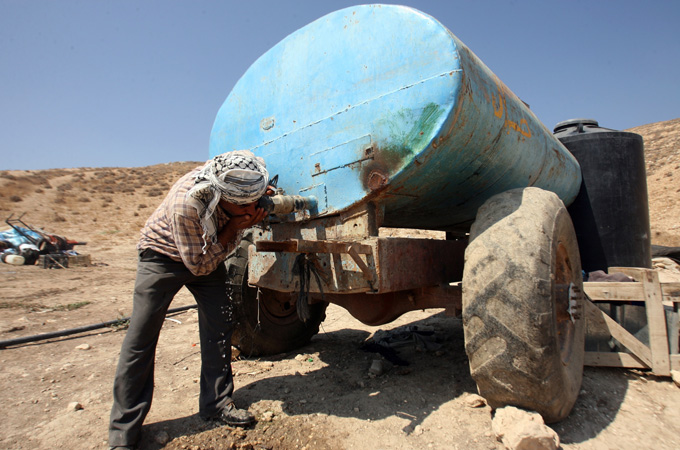PUTRAJAYA’S ADMISSION THAT WATER RATIONING WAS NOT NECESSARY IN SELANGOR AND KUALA LUMPUR HAS PROVEN THAT THE ISSUE WAS A POLITICAL GIMMICK TO DISCREDIT THE SELANGOR GOVERNMENT, STATE EXECUTIVE COUNCIL MEMBER ELIZABETH WONG SAID TODAY.
The Federal Government has made an initial decision not to allow the Selangor government to take over the operations of state water concessionaire Syarikat Bekalan Air Selangor (Syabas).
The special cabinet committee on the Selangor water issue agreed at its meeting that there are “substantial and procedural” matters that have not been met to allow Selangor to takeover Syabas.
 However, Deputy Prime Minister Muhyiddin Yassin (right) said the final decision would be made after the attorney-general deliberates on the matter.
However, Deputy Prime Minister Muhyiddin Yassin (right) said the final decision would be made after the attorney-general deliberates on the matter.“He has been instructed to call a meeting on this matter this afternoon,” he said after chairing a three-hour meeting in Putrajaya today.
Among the issues that stand in the way of the takeover, he said, is the state government’s failure to compensate Syabas after refusing a scheduled increase in the water tariff.
“The matter is now pending in court as Syabas is suing Selangor,” he said.Selangor had in 2009 refused to allow water tariffs to go up unless Syabas reduced its non-revenue water which currently involves one-third of supply.
Asked why Selangor was not invited to attend the discussion today, Muhyiddin said this was a Federal-level meeting.
“There are several matters which will have to involve Selangor but so far, this is (within) our scope of power,” he said. The committee came to the decision after consultations with the Energy, Green Technology and Water and National Water Services Commission.
 Palestinians in the Jordan Valley have very little access to water, living on 10-20 litres a day [EPA] | ||
At a time when the Palestinian Authority is facing a severe financial crisis, a report by the UK-based non-governmental organisation Oxfam International has revealed that Palestinians could generate an extra $1bn a year by some estimates if Israel removes restrictions on the use of land, water and movement in the Jordan Valley. “The Jordan Valley… has the potential to be the Palestinian bread basket,” the organisation said in the report, On the Brink: Israeli settlements and their impacts on Palestinians in the Jordan Valley. “However, the persistent expansion of Israeli settlements and other restrictions on Palestinian development have made life extremely difficult for Palestinian communities.” The Jordan Valley and Dead Sea area holds nearly one-third of the West Bank’s land and is home to roughly 60,000 Palestinians. Under the 1993 Oslo Accords, which delegated various degrees of autonomy to the Palestinian Authority (PA) around built up and urban areas, Israel retained full civil and military control over 60 per centof the West Bank. This is now known as Area “C”. Some 87 per cent of the Jordan Valley lies within this classification. Area “A” is defined as under full PA control and Area B is under Israeli military control; the PA here is in charge of civilian affairs. These designations have effectively divided the West Bank into three main non-contiguous areas. Permits denied
Palestinian residents of the Jordan Valley are mainly farmers or Bedouins, mostly living in enclaves hemmed in by closed Israeli military zones, checkpoints and more than 30 Israeli settlements. Their movement is severely hindered by a stringent permit system and by “live fire” zones. Here, the Israeli military sometimes carries out training exercises in close proximity to Palestinian communities – and even inside population centres and villages. This was the case in Al Aqaba, a herding and agricultural community located on the Western edge of the Jordan Valley. Before 1967, around 2,000 Palestinians lived in this small village. There are fewer than 300 inhabitants today, after Israeli authorities created three military camps on its outskirts, and began military “training exercises” – using live ammunition – often within the village itself. |
She also said that Syarikat Bekalan Air Selangor (Syabas) has been turned into an UMNO tool to coerce the Selangor government into approving the construction of the Sungai Langat Water Treatment Plant or Langat 2.
Putrajaya has said it will tender out the RM3.6 billion plant despite Selangor’s objections, citing hefty costs for constructing a new plant that will take two years to complete.readmorehttp://themalaybusinesstribune.blogspot.com/2012/07/israel-and-umno-cannot-secure-state.html





No comments:
Post a Comment